- Home
- Anne Bishop
Sebastian e-1 Page 6
Sebastian e-1 Read online
Page 6
Sebastian swallowed hard. There had been times when he’d been one of those children—running wild in the streets, as cunning and dangerous as animals. Then Nadia would arrive and take him back to her home for a few weeks or months—until Koltak showed up and the cycle started again. The children in Aurora, Nadia’s home village, knew what he was, and their name-calling and taunts revealed a nature more vicious and cruel than any creature he’d met in the Den, but being with Nadia meant being with Lee and Glorianna. Their love and acceptance couldn’t erase the cruelty, but without that tempering, he would have become the kind of incubus that was feared—the kind that thought of humans as nothing more than prey.
“So I told them they could have the food in exchange for doing a kindness for someone else,” William continued.
When the farmer didn’t say anything more, Sebastian prodded. “What happened?”
“Things changed,” William said quietly. “Not all at once. It doesn’t happen that way. But I brought up a wagon of produce each week once the land started to ripen and sold it in that section of the city. And things started to change. The children who paid for the food I gave them by doing a kindness for someone else helped old shopkeepers by sweeping the sidewalk or cleaning the shops. Some began to learn the merchant trade and were given cots in the back rooms and food as pay.
“Things changed for me, too. The land became richer. What I brought to the home market got a better price, and I began to prosper. One day at the market, I met a fine woman who wasn’t too proud to be a country farmer’s wife. We’ve got two children now, and that’s a wonder to me.” He paused and cleared his throat, as if emotions and memories had choked him for a moment.
“It’s still a poor part of the city, but it’s different now. Troublemakers aren’t comfortable there and don’t stay long. Folks look beyond their own doors these days and give their neighbors a helping hand. And I still bring a wagon of produce each week once the land ripens.”
“Did you ever see her again?” Sebastian asked.
William nodded. “Couple years ago. I was selling my last bushel of apples, and this woman held out a penny and smiled at me. By then I knew who she was, what she was, how dangerous she was. But I tell you, I don’t care what other folks say about her. She gave me a chance to change things the day I gave her a ride, and nothing but good has come from it.” He raised a hand and pointed. “There’s the city’s south gate. I’ll be turning off once we get past it. Will you be able to get on all right after that?”
“I know the way to the Wizards’ Hall,” Sebastian replied.
The land around them wasn’t flat, but the hill upon which Wizard City had been built dominated the countryside, as if some massive creature swimming beneath the surface had suddenly arched its back. No, more like a giant dog stretching its back and front legs in an invitation to play and pushing the earth up with its movement. The hill sloped gradually on this side, giving people enough of a foothold to build houses and spiraling roads that led to the plateau where the Wizards’ Hall and Tower looked down on the rest of the city. The other side of the hill was too steep for anything but pasturing sheep and goats.
They drove through the south gate in the high stone wall that circled the hill. William stopped his horses long enough for Sebastian to climb down.
“Travel lightly,” William said.
Sebastian nodded. “Thank you for the kindness.” He watched the wagon until it disappeared around a curve. Then he strode in the opposite direction toward a courtyard that was as old as the city.
In the beginning, the courtyard had been a place for meditation, for quieting one’s heart and thoughts before climbing the Thousand Stairs to Justice. Now it was flanked by barracks for the hard-eyed guards who kept order in the lower levels of the city, and he doubted if anyone who lingered in that tired place, with its dying trees and weed-choked flower beds, found any peace there.
He didn’t know if there had been a thousand stairs when they had been created or if someone had called them that because it sounded impressive. There wouldn’t be a thousand now, since the roads that were built afterward eliminated some of them, but it was still a climb that tested the strength of a man’s legs—and his determination to reach the top.
And it was still the fastest way up to the plateau where the wizards, the Justice Makers, reigned.
He heard the bell chime nine times as he stepped into the courtyard. Guards who had been lounging against the buildings straightened when they saw him. Ignoring them, he settled one strap of his pack over his shoulder and strode to the back of the courtyard as if he had every right to be there.
And he did. Anyone could petition the wizards for help. Of course, asking for help wasn’t the same as getting any.
The moment his foot touched the first stair, the guards lost interest in him. Wizards’ magic supposedly had built the stairs and still resided in them. It was said that the audience was merely a formality, that the wizards knew all that was needed about the petitioner by the time the person climbed the last stair.
He didn’t believe that was true. Even so, as he climbed he tried to empty his mind of everything but moving from one stair to the next. He didn’t want to remember the other times he’d been in this city—or the one and only time he’d seen the Wizards’ Hall.
But his muscles tightened, his heart pounded, and the despair and bitter anger that had colored so much of his childhood was a heavy rock strapped to his back with chains forged by cruel words.
He’d climbed these stairs once before.
How old had he been? Five? Maybe six? Just lingering at the edge of the street where he lived, as much to get away from the latest woman who was looking after him as to watch three girls playing catch with a bright-colored ball. He watched them, drinking in their laughter and happiness, unaware of his own nature or why their emotions made him feel as if he were gulping down cool water after being thirsty for so long.
A girl missed the catch, and the ball rolled right to him. He picked it up, and as he looked at the girls, he felt their happiness change to wariness. He knew what other boys would have done—kept the ball, since it was the kind of pretty toy rarely seen in this part of the city, or thrown the ball hard at one of the girls to scare her or hit her so she’d cry. But he wanted to hear the girls laugh again, so he tossed the ball gently to one of them. They studied him a moment, then went back to their game. But when the ball came around to the one who had missed it before, she motioned him forward and tossed the ball to him. And the triangle of girls became a square of four children playing catch and having fun.
Then the woman stomped out of the building and dragged him inside to the cramped, smelly rooms he called home.
She screamed at him about the demon inside him and the depraved nature she’d been told to watch for. Then she hit him, her heavy hand cracking across his face hard enough to send him to the floor.
But he’d scrambled to his feet, dodged past her…and ran until he reached the courtyard and the Thousand Stairs to Justice.
Some of the other women who had looked after him had been a little kinder. They’d told him his father was an important man, a wizard. But children weren’t allowed to live in the Wizards’ Hall, so he had to stay with them. He’d accepted that, had never questioned their explanation.
He raced up the stairs, his young legs fueled by anger. He hadn’t seen his father often, and the feelings that flowed out of the man made him uneasy, but that didn’t matter now. His father was an important man. His father was a wizard. And his father, after learning how mean the woman had been, would take him someplace else to live.
Yes, that’s what would happen. He would go live in a nice house with a kind woman who didn’t yell at him all the time or say bad things about him or hit him. And maybe there would be children to play with. Children who liked him, who wouldn’t call him names.
The need for that kind woman and those children swelled inside him, blotting out the anger. Hope filled him as he r
aced up the stairs.
When he finally reached the top of the stairs and ran along the path that led to the street and the high stone walls beyond, a vine of doubt curled around the hope and tried to smother it.
How was he supposed to get inside and find his father? What if he went inside the Petitioners’ Hall and asked for Koltak and the other wizards just sent him away? He had to get inside!
Then luck, or fate, or the nature of Ephemera gave him the opportunity. A man walked out of the wrought-iron gate next to the Petitioners’ Hall and gave it a negligent shove to close it. The gate stopped a hand-width away from locking.
He ran across the street and pulled the gate open just enough to slip inside. A different world, with more trees and greenery than he’d ever seen. He wandered along the paths, his father momentarily forgotten. It was so clean here. No smell of garbage or sour bodies.
Then, hearing laughter, he turned and made the discovery that changed his life.
Boys, not much older than him, running along another path toward the buildings at the other end of the courtyard garden. Boys. Living at the Wizards’ Hall.
He could have lived here, in this clean place—if his father had wanted him.
He stepped off the path and sat down next to a bush, curling up as much as he could to keep from being noticed. He cried silently while all the cruel words that had been said to him over the years took root deep in his heart.
Hearing footsteps on the path, he curled up tighter. But the footsteps stopped suddenly, the person stepped off the path and came around the bush—and he looked up at a woman with dark hair and dark, angry eyes. He flinched at the anger pouring off her, but when she crouched down, her voice was gentle.
“Who hit you?” she asked.
“The woman,” he muttered.
“Your mother?”
He shook his head. “The woman I lives with. She…keeps me.”
“Are you an orphan?”
Another head shake. “Don’t know my mother. My father…he doesn’t want me because I’m an incubastard.” He wasn’t sure what that was, but he knew now it was the reason he would never live in a clean place with kind people.
“What’s your name?”
“Sebastian.”
“I’m Nadia.” She hesitated, studying his face, staring deep into his green eyes. “Are you Koltak’s son?”
He nodded.
“Well, then. I guess that makes me your auntie.” She stood up and held out her hand. “Would you like to come live with me, Sebastian?”
The anger inside her had faded to sadness, but the warmth and kindness beneath the sadness, at the core of her, dazzled his young heart.
Getting to his feet, he took the offered hand—and the two of them walked away from the Wizards’ Hall.
Opportunities and choices. That was how Aunt Nadia explained how the currents of power worked. When a person made a heart wish, that wish resonated through the currents and things would happen to give the person an opportunity to make that wish come true. Like a gate not closing all the way. Like a woman, distressed and angry over the disappearance of her husband, hurrying down a path and stopping suddenly at the exact spot where a boy, who had the same green eyes as her own children, was hiding. Like a hand offered—and accepted.
Sebastian shook his head as he continued to climb.
Travel lightly. Think of something besides the past. Think of sitting in Philo’s courtyard on a summer night, drinking wine and watching the ebb and flow of people looking for a taste of the dark side. Think of sitting in Nadia’s kitchen, a room that felt bright and warm on even the dreariest day. Think of Nadia’s birds, those bright, playful little chatterheads. Travel lightly—or this place will swallow you whole.
His legs burned by the time he climbed the last stair. His heart burned, too, but not from exertion.
A cobblestone path cut between the stone walls that protected the houses of the wealthy who now shared the plateau with the wizards, leading to the street. Directly across the street was the Petitioners’ Hall—the only entrance common folk had to the part of the hill the wizards considered their exclusive domain.
As he crossed the street, he glanced at the structure that dominated the right-hand side of the wizards’ estate.
The Tower was the oldest structure in the city, and even now, centuries after it had been built, wizards still walked sentry duty, still kept watch.
For what? What had they once feared that they had built on the highest piece of land in this landscape? What did they still fear that they continued to keep watch?
He shook his head and banished those thoughts. Wizards claimed they feared nothing. He knew that wasn’t true—at least, not for the last fifteen years. Which was the only reason he risked entering this city.
The Petitioners’ Hall was connected to the wall surrounding the wizards’ private domain, separated from the buildings that made up the Wizards’ Hall by the expansive courtyard and garden he’d wandered through so many years ago. It still looked open and friendly with all its trees and greenery—if you didn’t consider the fact that only one gate next to the Petitioners’ Hall provided a way back into the rest of the city.
He opened the door of the Petitioners’ Hall and stepped into a long room. Stone floor, stone walls, and unadorned wooden benches that were, no doubt, uncomfortable if anyone had to sit on one for very long. The room was lit by oil lamps suspended from the ceiling, which had to burn all the time, since there were no windows to let in light. The place felt cold and hard as the stone it was built from.
He left the door open, more to give himself a way to escape than to indicate discourtesy, and strode to the desk at the back of the room.
Here there was some luxury. The big wooden desk gleamed in the lamplight. Beneath it was a pool of thick carpet that would keep the cold damp of stone from seeping into the feet of whoever was on duty.
Tonight it was a surly young man who closed the book he’d been reading and folded his hands over it. The badge he wore on his robe declared him a second-level wizard to anyone who knew what the symbols stood for.
“I need to see Wizard Koltak,” Sebastian said.
“It’s late,” the young wizard snapped. “Wizard Koltak isn’t on duty this evening to see petitioners. Take a seat and I’ll see who—”
“Nevertheless, Koltak will see me.”
The wizard looked outraged. “And who are you?”
“Sebastian. From the Den of Iniquity.”
The surly look gave way to fascinated revulsion. So. This one had heard the stories that had been whispered in the student quarters—and perhaps still were. A lesson for the lusty and foolish.
The wizard grabbed a small piece of parchment from the stack on the corner of his desk. Snatching up the quill and dipping it into the inkwell, he didn’t notice that he dribbled ink on the desk’s gleaming wood. Hurried scribbles. The ink barely had time to dry before the wizard folded the parchment and shouted, “Boy!”
A boy dozing on a bench close to the desk scrambled to answer the summons. The folded parchment was handed off, and the boy dashed out the door in the back of the room.
Your pen dribbles. A simple phrase that held a wealth of meanings when an incubus said it. It was tempting to see if this young wizard would find the call of an incubus more alluring than that of a succubus, but he already had enough enemies among the wizards.
So he just gave the wizard a lazy smile that suggested traveling to reach this place wasn’t the reason he looked disheveled.
A few minutes later, the boy dashed back into the room, breathless, and handed a folded piece of parchment to the wizard. The man looked startled as he read the command, but he said, “The boy will lead you.”
Giving the wizard an insolent salute, Sebastian followed the boy out the back door and across the courtyard. Instead of going through the door of the main building, the boy turned to the right and led him to another door.
The hair on the back of Sebastian’s neck
rose as he noticed that the windows on either side of the door had a queer sparkle in places where the light from the courtyard lamps touched the glass. Wooden shutters were folded back on the outside of the windows.
The boy pushed the door open and entered the dark space.
Sebastian heard the clink of glass against metal, then the scrape of a match. Staying in the doorway, he watched the boy light the candle and replace the globe over the metal candleholder.
When the boy turned to leave, Sebastian stepped into the room to let him pass. But when the boy reached for the handle to pull the door closed, some instinct made Sebastian grab the wood and growl, “Leave it open.”
The boy bolted into the night.
Not sure why he’d responded that way, Sebastian looked at the door—and felt a shiver run down his spine.
No handle on this side. No way for a person inside this room to open the door.
Slipping his pack from his shoulder, he set it against the door and went over to one of the windows, alert for any sound in the courtyard.
Thick glass that extended into the stone. A mesh of wire embedded in the glass. Even if someone managed to break the glass, he still wouldn’t be able to escape through a window.
Turning, Sebastian studied the room. A table, two chairs, and the globed candleholder. No other visible means of exiting the room, although there probably was a hidden door or other kind of opening.
What it all meant was that once the door was closed, the only way a person could leave this room was if someone on the outside opened the door.
His hands trembled as he went back to the door and picked up his pack. After settling it over his shoulder, he shifted so his back wasn’t completely exposed to the courtyard. At least he’d have some warning if someone tried to rush him and shove him into the room.
A scrape of boot on stone. Sebastian scanned the courtyard. The place looked so open, but the lamplight played with the surroundings in such a way that there were patches of deep shadow that could hide anything.

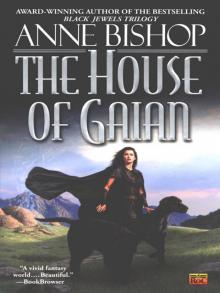 The House of Gaian
The House of Gaian Heir to the Shadows
Heir to the Shadows Queen of the Darkness
Queen of the Darkness Shaladors Lady
Shaladors Lady Written in Red
Written in Red Lake Silence
Lake Silence The Voice
The Voice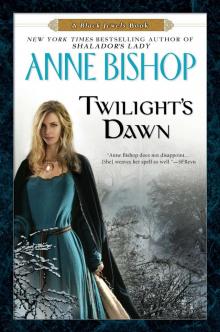 Twilights Dawn
Twilights Dawn Daughter of the Blood
Daughter of the Blood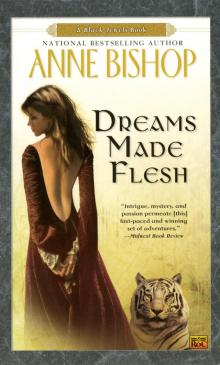 Dreams Made Flesh
Dreams Made Flesh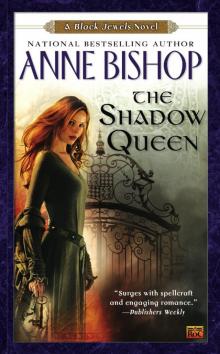 The Shadow Queen
The Shadow Queen Etched in Bone
Etched in Bone Wild Country
Wild Country Vision in Silver
Vision in Silver Sebastian
Sebastian Shadows and Light
Shadows and Light The Queen's Bargain
The Queen's Bargain Bridge of Dreams
Bridge of Dreams The Queen's Weapons
The Queen's Weapons Pillars of the World
Pillars of the World Marked in Flesh
Marked in Flesh Heir to the Shadows dj-2
Heir to the Shadows dj-2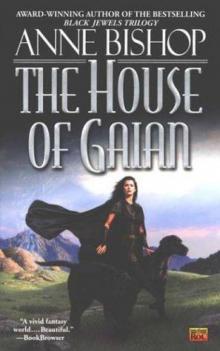 The House of Gaian ta-3
The House of Gaian ta-3 Marked In Flesh (The Others #4)
Marked In Flesh (The Others #4)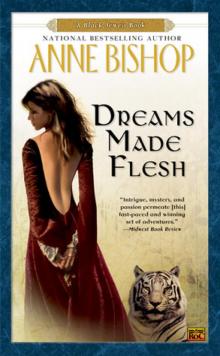 Dreams Made Flesh bj-5
Dreams Made Flesh bj-5 Written In Red: A Novel of the Others
Written In Red: A Novel of the Others Twilight's Dawn dj-9
Twilight's Dawn dj-9 Shalador's Lady bj-8
Shalador's Lady bj-8 The Pillars of the World
The Pillars of the World Bridge of Dreams e-3
Bridge of Dreams e-3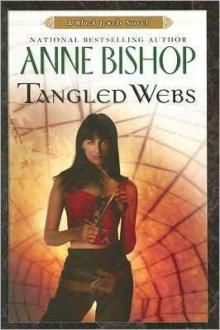 Tangled Webs bj-6
Tangled Webs bj-6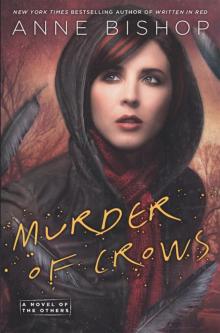 Murder of Crows: A Novel of the Others
Murder of Crows: A Novel of the Others Sebastian e-1
Sebastian e-1 Queen of the Darkness bj-3
Queen of the Darkness bj-3 Belladonna e-2
Belladonna e-2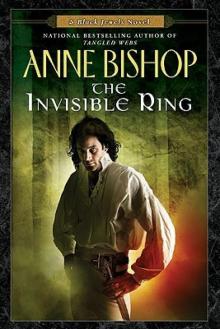 The Invisible Ring bj-4
The Invisible Ring bj-4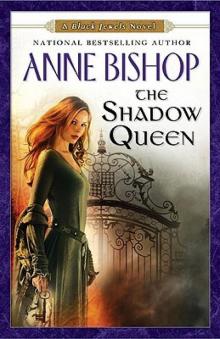 The Shadow Queen bj-7
The Shadow Queen bj-7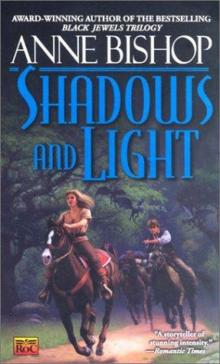 Shadows and Light ta-2
Shadows and Light ta-2 Daughter of the Blood bj-1
Daughter of the Blood bj-1 The Voice: An Ephemera Novella(An eSpecial from Roc)
The Voice: An Ephemera Novella(An eSpecial from Roc) The Pillars of the World ta-1
The Pillars of the World ta-1